|
|
|
Sort Order |
|
|
|
Items / Page
|
|
|
|
|
|
|
| Srl | Item |
| 1 |
ID:
080491
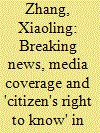

|
|
|
|
|
| Publication |
2007.
|
| Summary/Abstract |
This study examines the Chinese media's coverage of the Iraq War and SARS in 2003, that of CCTV in particular, and discusses the 'citizen's right to know' which became popularised in China during these two breaking news events. After delineating the moves that CCTV has been making, the paper argues that in the face of globalisation of information the party-state is actively involved in pursuit of image reconstruction both at home and internationally, and of having a voice in the new world order. Findings show that although the Chinese media do not lack the capacity to honor the 'citizen's right to know', the coverage of breaking news is determined by the state's perception of a given situation.
|
|
|
|
|
|
|
|
|
|
|
|
|
|
|
|
| 2 |
ID:
160504


|
|
|
|
|
| Summary/Abstract |
Owing to China’s austere censorship regulations on film media, directors of films and documentaries engaging with lesbian, gay, bisexual and transgender themes have struggled to bring their work to domestic attention. Working outside of the state-funded Chinese film industry has become necessary for these directors to commit their narratives to film, but without approval of China’s State Administration of Press, Publication, Radio, Film and Television, these artists have had little chance of achieving widespread domestic distribution of their work. However, advancements in new media technology and Web 2.0, ranging from digital video formats to Internet-based distribution via social media networks and video-hosting platforms, provide opportunities for Chinese audiences to access films and documentaries dealing with LGBT themes. This empirical study assesses how production, promotion and consumption of queer documentary films are influenced by the development of social media within Chinese cyberspace. Through close readings of microblogs from SinaWeibo, this study combines analysis of contemporary research with digital social rights activism to illustrate contemporary discourse regarding film-based LGBT representation in China. Finally, the study comments on the role that documentary filmmaking plays in China’s gay rights movement, and discusses the rewards (and challenges) associated with increased levels of visibility within society.
|
|
|
|
|
|
|
|
|
|
|
|
|
|
|
|
| 3 |
ID:
176692
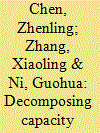

|
|
|
|
|
| Summary/Abstract |
Economic cycles in the form of capacity utilization might greatly affect productivity. In order to explore how does carbon dioxide emissions reduction influence capacity utilization, this paper proposes a novel method to decompose the total capacity utilization (TCU) rate under carbon dioxide emissions reduction constraints using data envelopment analysis. The TCU rate is decomposed into an equipment utilization rate (EU), low-carbon technology efficiency (CTE), and policy oriented capacity utilization rate (PCU), and four policy orientations are then simulated to investigate the performance of TCU and its components. Three main conclusions are drawn: (1) the TCU rate was basically maintained between 60% and 70%, indicating a serious overcapacity in China. (2) most regions with a higher TCU rate are the well-developed southeast coastal regions, those with lower TCU rates being mainly the central and western regions; (3) the mandatory emission reduction mode is one of the main causes of overcapacity, where the southeastern coastal areas in particular suffer the most severe capacity loss. In comparison, a win-win development mode is the most cost-effective for China, with a relatively small capacity loss. These conclusions could assist policy designers in improving capacity utilization through effective low-carbon policies.
|
|
|
|
|
|
|
|
|
|
|
|
|
|
|
|
| 4 |
ID:
111332
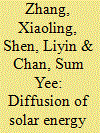

|
|
|
|
|
| Publication |
2012.
|
| Summary/Abstract |
The world is facing the severe challenges of energy depletion and carbon dioxide (CO2) emissions, and solar energy is considered to be a promising source of renewable energy and effective solution. However, the application of solar energy is limited in practice due to various barriers. Based on data collected from a survey of practice, this paper identifies the key barriers to the deployment of solar photovoltaic (PV) energy systems in Hong Kong. These include "high initial and repair cost", "long payback period", "inadequate installation space and service infrastructure", "lack of participation of stakeholders/community in energy policy" and "lack of incentives by legislation and regulation". Recommendations for addressing these barriers are proposed. For example, the high cost of solar PV energy systems can be reduced by the development and mass production of low-cost fabrication technologies and high performance PV technologies. Solar thermal applications should be encouraged as they are much more economical than solar PVs. It is also recommended that the Hong Kong Government adopt strategies to encourage a greater use of solar energy systems. The results from this study not only provide useful information for the Government, the private sector and consumers in Hong Kong but are also likely to apply equally to other similar regions around the world.
|
|
|
|
|
|
|
|
|
|
|
|
|
|
|
|
| 5 |
ID:
171482
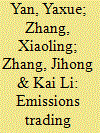

|
|
|
|
|
| Summary/Abstract |
The study aims to employ the difference-in-differences method and mediating effect model to assess panel data of 267 prefectural-level cities in Chinese 30 provinces from 2003 to 2016 and empirically examines whether the Emissions Trading System pilot has realized collaborative governance effects upon air pollution. This study verifies the rationality of the element design of China's Emissions Trading System pilot from the perspective of environmental effects. The results indicate that the China's Emissions Trading System pilot does have a significant ‘reduction effect’ on haze pollution concentration level, which is probably achieved by ‘boosting the application and transformation of green technologies among enterprises’ and ‘transferring heavily polluted industries’. Moreover, the total quota allocation, total number of incorporated enterprises and the entry of institutional and individual investors were not the significant influencing factors for reducing haze pollution, while the transaction volume of China Certified Emission Reduction and the total penalty amounts incurred play significant roles. The heterogeneity test shows that only Guangdong province's policy has a significantly negative effect on haze pollution concentration. This study provides a new way of thinking for the coordinated governance mode by combining environmental governance and carbon trading scheme. The experiential evidence strongly supports the establishment and improvement of China's Emissions Trading System pilots and the implementation of a unified national carbon market.
|
|
|
|
|
|
|
|
|
|
|
|
|
|
|
|
| 6 |
ID:
102792
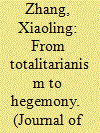

|
|
|
|
|
| Publication |
2011.
|
| Summary/Abstract |
This paper argues that negotiation and accommodation between the state and the media, with the latter having gained more bargaining power, should be considered in assessing the transformation of the Chinese media. It examines the discourses of media professionals on the coverage of the 2008 Sichuan Earthquake to reveal how they seized the opportunity presented by the well-received breakthrough in the coverage of the earthquake to bargain with the state for more autonomy. The purpose of the examination is three-fold. First, what drove the Chinese state media such as CCTV to risk breaking regulations? Secondly, how did the Central Government respond to the media-led breakthrough? Answers to these questions prepare the ground for the final one, and that is, how do media professionals bargain with the state for more autonomy?
|
|
|
|
|
|
|
|
|
|
|
|
|
|
|
|
| 7 |
ID:
171409
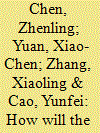

|
|
|
|
|
| Summary/Abstract |
The implementation of a national emissions trading scheme (ETS) in China is likely to have an important effect on potential regional gains. This study proposes a unified analytical framework for anticipating such gains in 2020 and estimates the key factors involved using data envelopment analysis based models. The results indicate that: (1) when the value of the marginal abatement cost is higher than the carbon price, no regions will have an incentive to reduce emissions by technological improvements. The only source of direct potential gains is from the amounts of carbon quota. (2) As carbon price increases from CNY 10 to 4000 per ton, the indirect potential gains will increase because the strategies for carbon reduction are technological innovation or limit economic activities. However, Jiangsu and Shanghai will suffer potential losses even though the price is high because they have no more carbon reduction potential. (3) Most central provinces will have potential gains when the carbon price is lower in ETS, while regions rich in fossil energy sources will suffer potential losses. However, a middle-price interval of CNY 1000–2000/ton is more rational, because it helps motivate market transactions and benefits low-carbon technological innovations.
|
|
|
|
|
|
|
|
|
|
|
|
|
|
|
|
| 8 |
ID:
161262


|
|
|
|
|
| Summary/Abstract |
Guided by Michel Foucault's concept of “pastoral power,” this article examines the ways in which contemporary discourses within official narratives in China portray the state in a paternal fashion to reinforce its legitimacy. Employing interdisciplinary approaches, this article explores a number of sites in Urumqi, the regional capital of the Xinjiang Uyghur Autonomous Region (XUAR), in order to map how a coherent official narrative of power and authority is created and reinforced across different spaces and texts. It demonstrates how both history and the present day are depicted in urban Xinjiang in order to portray the state in a pastoral role that legitimates its use of force, as well as emphasizing its core role in developing the region out of poverty and into “civilization.”
|
|
|
|
|
|
|
|
|
|
|
|
|
|
|
|
|
|
|
|
|